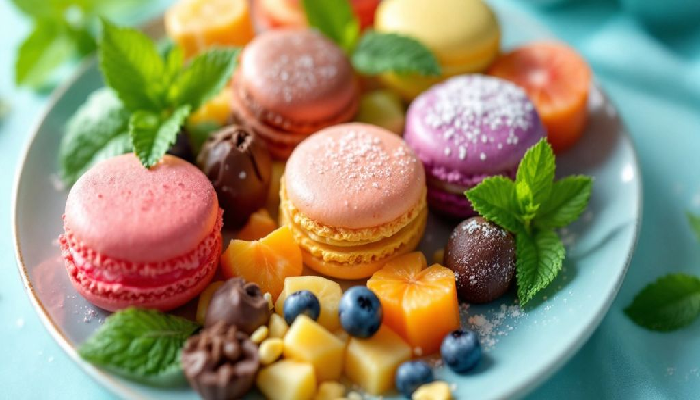Want sweet after brushing teeth

Want sweet after brushing teeth Many people experience a strong desire for sweets right after brushing their teeth. This craving can be puzzling, especially since brushing is meant to clean our mouths and protect our teeth. Understanding why we crave sweets after brushing can help us make better choices for our oral health and satisfy our sweet tooth without causing damage.
Key Takeaways
- Sweets can be tempting after brushing due to lingering flavors of toothpaste.
- Eating sugary snacks right after brushing can harm your teeth if done repeatedly.
- It’s best to wait at least 30 minutes after eating sweets before brushing your teeth again.
- Rinsing your mouth with water can help reduce sugar and acid buildup after eating.
- Choosing healthier snacks can satisfy cravings without risking your dental health.
Understanding the Craving for want sweet after brushing teeth
The Science Behind the Craving
After brushing your teeth, you might feel a strong desire for something sweet. This craving can be explained by a few factors:
- Taste Sensation: Brushing often leaves a fresh, minty taste in your mouth, which can make you want to balance it with something Want sweet after brushing teeth
- Sugar’s Appeal: Our brains are wired to enjoy sugar, making it hard to resist after a clean mouth.
- Conditioning: If you often eat sweets after brushing, your brain may start to expect it, creating a habit.
Psychological Factors
The desire for sweets can also be influenced by psychological aspects:
- Reward System: Eating sweets releases feel-good chemicals in the brain, making you want to repeat the experience.
- Stress Relief: Many people turn to sweets for comfort, especially after a long day.
- Social Influences: Seeing others enjoy sweets can trigger cravings, even if you just brushed your teeth.
Impact of Toothpaste Flavors
The flavor of your toothpaste can play a role in your craving forwant sweet after brushing teeth.
- Minty Toothpaste: The strong mint flavor can make sugary foods seem even more appealing.
- Fruity Toothpaste: If your toothpaste has a fruity flavor, it might make you crave actual fruit or candy.
- Sweet Toothpaste: Some toothpastes are designed to taste sweet, which can lead to a desire for more sugar after brushing.
Understanding these factors can help you manage your cravings and maintain better oral health.
Effects of Eating Sweets After Brushing Teeth

Eating want sweet after brushing teeth your can have several negative effects on your oral health. Here are some key points to consider:
Impact on Tooth Enamel
- Bacteria Growth: When you eat want sweet after brushing teeth. leftover sugar can feed bacteria in your mouth. This can lead to plaque formation, which harms your enamel.
- Acid Production: Bacteria produce acids when they digest sugar. These acids can weaken and damage your tooth enamel, increasing the risk of cavities.
- Acid Erosion: Eating acidic foods or want sweet after brushing teeth can expose your teeth to more acid, which can erode enamel over time.
Bacterial Growth and Plaque Formation
- Food Particles: After brushing, if you eat, food particles can remain on your teeth, providing a feast for bacteria.
- Overnight Damage: Bacteria thrive on sugar, especially overnight when saliva production decreases. This can lead to more plaque and bad breath in the morning.
- Increased Risk of Cavities: The longer sugar stays on your teeth, the higher the chance of developing cavities.
Morning Breath Issues
- Bad Breath: Eating want sweet after brushing teeth can wash away the fresh minty flavor of toothpaste, leading to unpleasant morning breath.
- Bacterial Growth: The sugar left on your teeth allows bacteria to multiply overnight, which contributes to bad breath.
- Unpleasant Taste: You may wake up with a bad taste in your mouth due to the sugar and bacteria that have built up overnight.
In summary, eating sweets after brushing your teeth can lead to enamel damage, increased bacterial growth, and bad breath. It’s best to avoid this habit to maintain good oral health.
Best Practices to Maintain Oral Health
Timing Your Brushing and Eating
- Wait 30 minutes after eating before brushing your teeth. This allows saliva to neutralize acids and helps protect your enamel.
- Brush twice a day, ideally after breakfast and before bed, to keep your teeth clean and healthy.
- Floss daily to remove food particles and plaque between your teeth where a toothbrush can’t reach.
Choosing the Right Toothpaste
- Use fluoride toothpaste to strengthen tooth enamel and prevent cavities.
- Pick a toothpaste that suits your needs, such as sensitivity or whitening, to address specific dental concerns.
- Avoid abrasive toothpaste that can wear down enamel over time.
Importance of Regular Dental Check-Ups
- Visit your dentist every six months for a professional cleaning and check-up.
- Early detection of problems can save you from more serious issues and costly treatments later.
- Ask your dentist for personalized advice on maintaining your oral health based on your specific needs.
Healthy Alternatives to Satisfy Sweet Cravings

When you feel the urge for something sweet after brushing your teeth, there are healthier options that can satisfy your cravings without harming your dental health. Here are some great alternatives:
Low-Sugar Snacks
- Nuts: Almonds and walnuts are tasty and low in sugar. They also provide healthy fats.
- Popcorn: Air-popped popcorn is a crunchy snack that can be enjoyed without added sugar.
- Rice Cakes: These can be topped with a small amount of nut butter for a sweet yet healthy treat.
Fruits That Are Gentle on Teeth
- Apples: Crunchy and sweet, apples can help clean your teeth while satisfying your sweet tooth.
- Berries: Strawberries and blueberries are low in sugar and packed with vitamins.
- Bananas: They are naturally sweet and easy to eat, making them a great option.
Dairy Products and Their Benefits
- Greek Yogurt: Opt for low-sugar varieties. It’s creamy and can be mixed with fruits for added sweetness.
- Cheese: Cheese can help neutralize acids in your mouth, making it a good choice after sweets.
- Milk: A glass of milk can be a satisfying way to curb your sweet cravings while providing calcium for your teeth.
By choosing these healthier options, you can enjoy something want sweet after brushing teeth without putting your teeth at risk.
Tips to Minimize Damage If You Eat After Brushing
Eating after brushing your teeth can be tempting, but it can also harm your oral health. Here are some tips to help you minimize the damage:
Rinsing Your Mouth
- Rinse with Water: After eating, rinse your mouth with water to help wash away food particles and sugars.
- Use Mouthwash: If possible, use a fluoride mouthwash to strengthen your teeth and reduce bacteria.
- Avoid Sugary Drinks: Stay away from sugary drinks after brushing, as they can increase the risk of cavities.
Chewing Sugar-Free Gum
- Stimulates Saliva: Chewing sugar-free gum can help produce saliva, which naturally cleans your mouth and neutralizes acids.
- Freshens Breath: It can also help keep your breath fresh after eating.
- Choose Xylitol Gum: Look for gum that contains xylitol, which can help fight cavity-causing bacteria.
Brushing Again Before Bed
- Brush After Eating: If you must eat after brushing, try to brush your teeth again before bed.
- Use a Soft-Bristled Toothbrush: This will help protect your enamel while cleaning your teeth.
- Wait 30 Minutes: If you’ve eaten acidic foods, wait at least 30 minutes before brushing to avoid damaging softened enamel.
By following these tips, you can help protect your teeth even if you indulge in a snack after brushing.
The Role of Saliva in Oral Health
Saliva plays a crucial role in keeping our mouths healthy. It helps protect our teeth and gums in several ways:
How Saliva Protects Your Teeth
- Neutralizes Acids: Saliva helps to balance the acids produced by bacteria in our mouths, which can harm tooth enamel.
- Washes Away Food Particles: It helps remove leftover food, reducing the chances of plaque buildup.
- Provides Minerals: Saliva contains minerals like calcium and phosphate that can help repair early signs of tooth decay.
Ways to Stimulate Saliva Production
- Stay Hydrated: Drinking plenty of water can help keep your mouth moist.
- Chew Sugar-Free Gum: This can encourage saliva flow, especially after meals.
- Eat Crunchy Fruits and Vegetables: Foods like apples and carrots can naturally stimulate saliva production.
Foods That Promote Saliva Production
- Citrus Fruits: Oranges and lemons can increase saliva flow due to their acidity.
- Cheese: Dairy products can help neutralize acids and promote saliva.
- Nuts: They are not only healthy but also encourage chewing, which boosts saliva production.
Understanding Acid Erosion and Prevention
What Is Acid Erosion?
Acid erosion happens when acids wear away the enamel on your teeth. This can lead to sensitivity and cavities. It’s important to understand what causes this erosion to protect your teeth better.
Foods and Drinks to Avoid
Certain foods and drinks can harm your teeth. Here’s a list of some common culprits:
- Citrus Fruits: Oranges, lemons, and grapefruits are very acidic.
- Sodas: Both regular and diet sodas can be harmful due to their acidity.
- Tomatoes: These can also be quite acidic and should be consumed in moderation.
Preventive Measures to Protect Enamel
To keep your enamel strong, consider these tips:
- Wait Before Brushing: After eating acidic foods, wait at least 30 minutes before brushing your teeth. This allows your enamel to harden again.
- Drink Water: Rinse your mouth with water after consuming acidic foods to help neutralize the acids.
- Use a Soft-Bristled Toothbrush: This can help prevent further wear on your enamel when brushing.
Summary Table of Foods and Their Acidity Levels
| Food/Drink | Acidity Level |
|---|---|
| Citrus Fruits | High |
| Sodas | High |
| Tomatoes | Moderate |
| Apples | Low |
| Bananas | Low |
By being mindful of what you eat and how you care for your teeth, you can help prevent acid erosion and maintain a healthy smile.
Final Thoughts on Enjoying Sweets After Brushing
In conclusion, while it’s tempting to indulge in want sweet after brushing teeth your teeth, it’s best to avoid doing so. Eating sugary treats can lead to plaque buildup and cavities, especially if you don’t brush again afterward. If you must snack, consider waiting at least 30 minutes after brushing to allow your enamel to harden again. Opt for healthier snacks like cheese or nuts, which are less likely to harm your teeth. Remember, maintaining good oral hygiene is key to enjoying sweets without compromising your dental health.
Frequently Asked Questions
Why do I crave sweets after brushing my teeth?
After brushing, your mouth feels clean, which can make you want to enjoy something sweet. The flavor of toothpaste can also make sweets taste even better.
Is it bad to eat sweets after brushing my teeth?
Yes, eating sweets after brushing can harm your teeth. It can lead to cavities and bad breath because sugar feeds the bacteria in your mouth.
How long should I wait to brush my teeth after eating sweets?
It’s best to wait at least 30 minutes after eating sweets before brushing your teeth. This gives your saliva time to wash away some of the sugar and acids.
What can I do if I really want something sweet after brushing?
Try eating low-sugar snacks or fruits that are gentle on your teeth. You can also chew sugar-free gum to help clean your mouth.
How can I protect my teeth if I eat after brushing?
If you eat after brushing, rinse your mouth with water afterward. Chewing sugar-free gum can also help remove sugar from your teeth.
Why is saliva important for my teeth?
Saliva helps protect your teeth by washing away food particles and neutralizing acids. It also helps remineralize your enamel.



